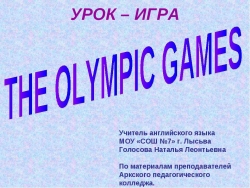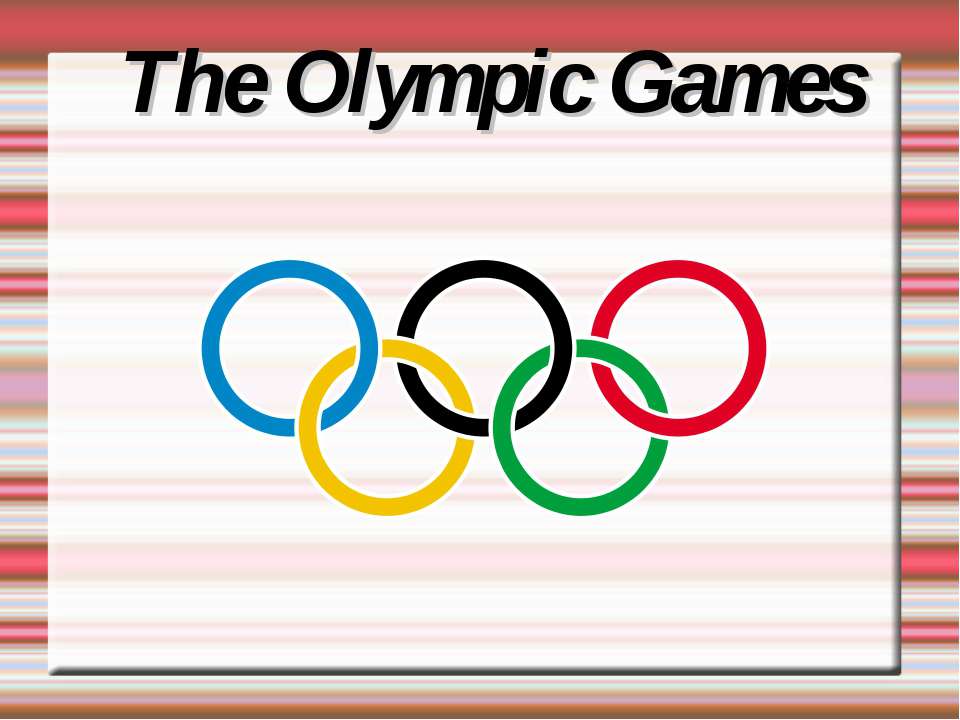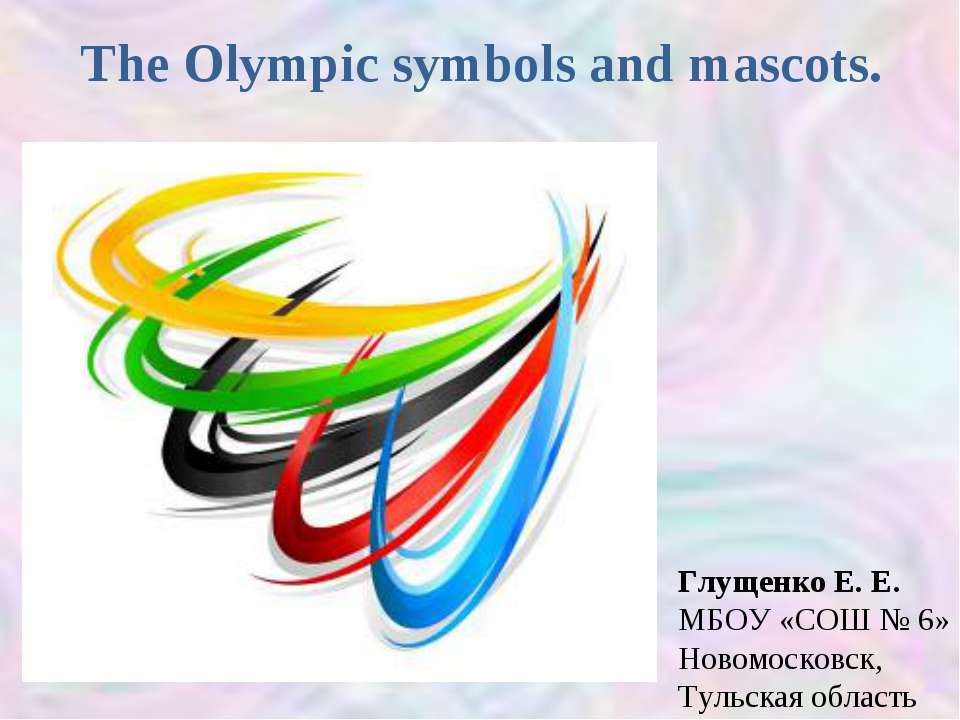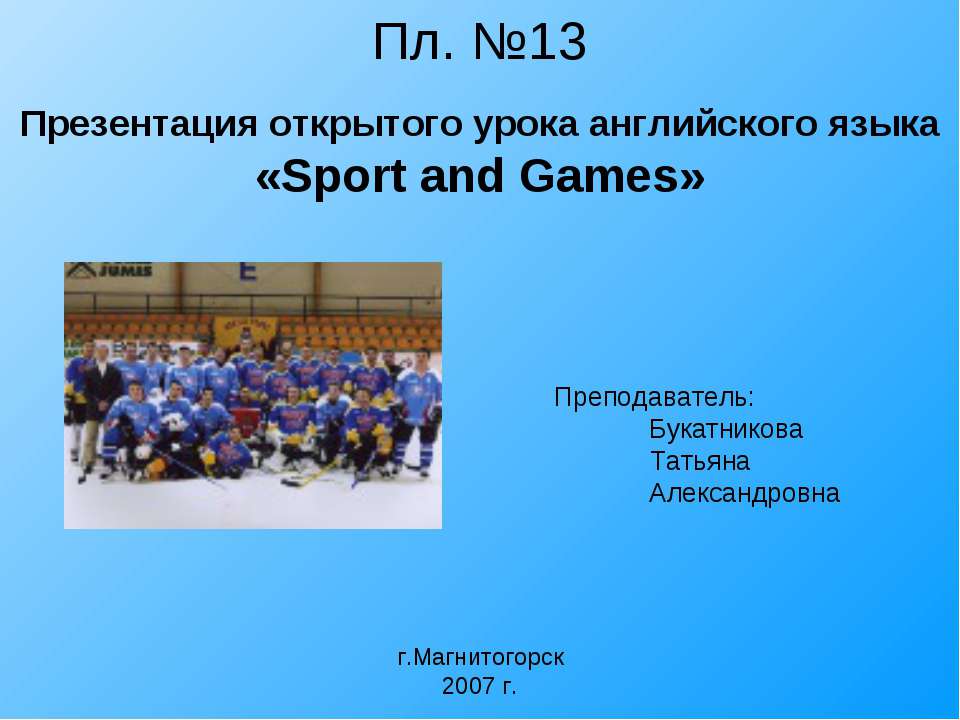УРОК – ИГРА The Olympic Games

- Рубрика: Презентации / Презентации по английскому языку
- Просмотров: 241
Презентация для классов "УРОК – ИГРА The Olympic Games" онлайн бесплатно на сайте электронных школьных презентаций uchebniki.org.ua
УРОК – ИГРА Учитель английского языка МОУ «СОШ №7» г. Лысьва Голосова Наталья Леонтьевна По материалам преподавателей Аркского педагогического колледжа.
Как организовать работу учащихся на заключительном уроке по теме, чтобы - урок был необычным и увлекательным - все учащиеся проявили активность и продемонстрировали сформированные компетенции: языковую речевую социокультурную компенсаторную учебно-познавательную - была возможность применить разные формы организации работы учащихся и современные технологии ?
Такой урок можно провести в форме игры “The Olympic Games”. -Учащиеся работают в группах /команды приезжают на игры из разных стран/, в парах, индивидуально. -Жюри или учитель оценивают ответы. -Конкурсам присвоены названия видов спорта. -Содержание конкурсов учитель может менять согласно изученной теме
Each participant should say 10 /20/ words in such a way that every other word begins with a letter that is at the end of the previous word. The contestant who is the first to complete the task will be the winner. For example: Friend – duty – young – generous . . .
Each contestant should write and pronounce the longest and the most difficult word. The participant whose word has the largest number of letters is the winner. For example: Friendship, misunderstanding, trustworthy . . . .
Each group thinks of 5 words /nouns, verbs or adjectives/ and exchanges the lists. The opponents must find antonyms or synonyms to the given words. The winner is the team that has more correct variants than the others. For example: Antonyms a friend – an enemy Synonyms true - close truth – lie like - enjoy young – old funny - amusing peace – war boring - dull happy - sad convince - persuade
Each team has got a long word. Using the letters of this word the participants should make up new words. The team which makes up the most number of the words is the winner. For example: friendship – friend, ship, pen, fried, pine, her, fish, hip, ride. . .
The distance of the flight will be determined according to the number of words used in each sentence. The sentence may be compound, but it must have a definite logical meaning. The winner is the team that has constructed the longest sentence. For example: It goes without saying good friends are people who spend a lot of time together and are always ready to give a helpful hand to one another.
The contestants of each team think of 5 questions on the topic. The participant who reads the questions throws a disc /a ball / to one of the participants of the other team and asks a question. The opponents answer and throw the disc and ask their own question. The winner is the team which has the most correct questions and answers.
The teacher reads a text. The contestants should listen to the text attentively. They should repeat sentence by sentence in turn to retell the text up to the end. The team which gives the most correct and full sentences is the winner.
Each team gets a card with a situation for discussion. It can be a problem. The first team gives their own solution of the problem. In turn the opponents must try to give arguments against this solution. The next team does the same. The judge decides which team has been more active and has given the best defence of their problem.
The contestants of the teams should give one part of an English proverb on the topic. The opponents have to complete the proverb and give the Russian variant. The winner is the team which has given the most number of proverbs. For example: A friend in need is a friend indeed. A friend to all is a friend to none. A man is known by the company he keeps. They are rich who have friends. Better an open enemy than a false friend.
The participants of each team write a poem and present it. For example: Friends sociable generous understand trust care Life’s boring without friends. Happiness!


















